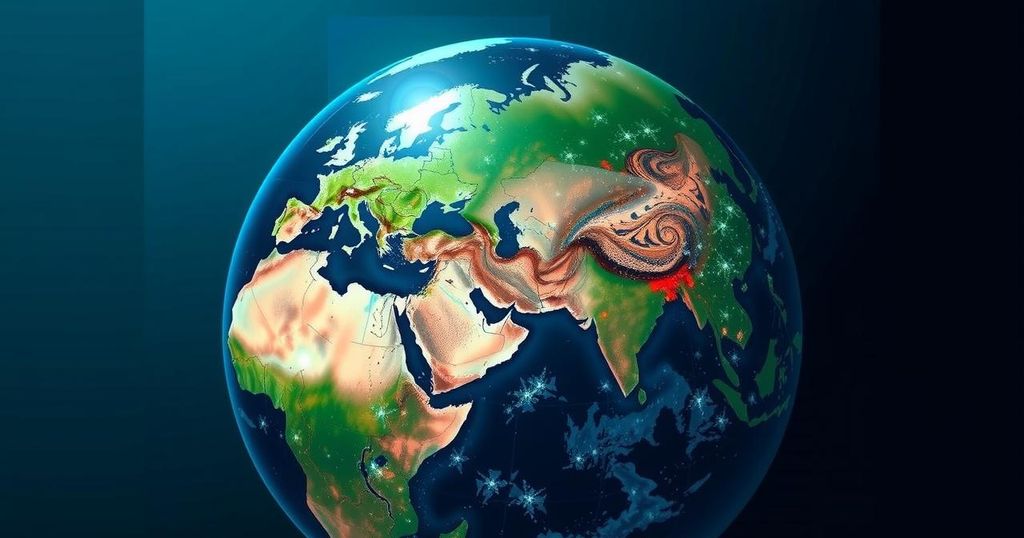Climate change
AFP, ASIA, AZERBAIJAN, CLIMATE CHANGE, ENVIRONMENTAL POLICY, EUROPE, GLOBAL WARMING, HAGUE, HUMAN RIGHTS, INTERNATIONAL COURT OF JUSTICE, JUL, JULE SCHNAKENBERG, JUSTICE, NA, NETHERLANDS, OCEANIA, PACIFIC ISLAND, PACIFIC OCEAN, PARIS AGREEMENT, PEACE PALACE, RALPH REGENVANU, SCENIC PEACE PALACE, SIOSIUA VEIKUNE, THE HAGUE, TONGA, UNITED NATIONS, VANUATU, WORLD ' S YOUTH FOR CLIMATE JUSTICE
Marcus Li
0 Comments
ICJ Commences Landmark Hearings on Climate Change Legal Obligations
The ICJ began historic hearings on December 2, 2024, to define legal obligations for countries regarding climate change. Over 100 entities are represented, including vulnerable Pacific nations, amid hopes for meaningful legal guidance. The hearings follow the COP29 agreement for climate finance, criticized as insufficient. The potential court opinion could shape international climate litigation and obligations, reflecting the escalating urgency facing climate-impacted nations.
On December 2, 2024, the International Court of Justice (ICJ) commenced unprecedented hearings to establish legal guidelines regarding countries’ obligations to combat climate change and support vulnerable nations facing its dire effects. This landmark event at The Hague marks the participation of over 100 entities, including nations and organizations, the highest number to date. Representatives from Vanuatu and other Pacific island states initiated the proceedings, hoping for a significant legal opinion that would influence climate action policies. Despite the potential for far-reaching consequences, some critics express doubts about the effectiveness of this non-binding advisory opinion, foreseeing a prolonged wait for the court’s judgement.
The hearings are crucial as global climate negotiations continue to struggle. Just days before this event, COP29 resulted in a contentious agreement whereby wealthy countries committed to providing $300 billion annually by 2035 for climate transition in developing nations, though it was criticized as inadequate by many. Protesters gathered outside the venue expressing their hopes for a breakthrough in climate justice, reinforcing the sentiment that these hearings are a pivotal moment for the climate justice movement.
Vanuatu’s envoy highlighted the importance of the ICJ’s advisory opinion, emphasizing the crucial question of state obligations under international law regarding greenhouse gas emissions and the legal ramifications for those causing substantial environmental harm. This initiative, supported by various small island nations threatened by rising sea levels, seeks to clarify the legal responsibilities of larger nations regarding climate change impacts on vulnerable populations.
Legal experts anticipate that while the ICJ may not provide specific answers, it will establish a legal framework that could guide future climate litigation at all governmental levels. The opinion’s outcome, due in the coming year, is poised to influence not only ongoing international legal disputes but also national climate strategies. Although efforts have been made to limit global temperature rise, scientific data indicate that emissions have reached record highs, highlighting the urgency for a constructive judicial orientation on climate obligations.
The International Court of Justice (ICJ) has been tasked with developing clear legal parameters regarding international obligations aimed at climate protection. The latest hearings represent a collaborative effort from nearly 100 nations and organizations, led by vulnerable island nations primarily impacted by climate change. Against a backdrop of ongoing global climate negotiations, there is an urgent necessity to understand the legal responsibilities of polluting states, especially in view of the escalating climate crisis that threatens the existence of many low-lying coastal countries. The hearings signify a critical opportunity for advancing legal discourse around climate justice and accountability.
The hearings at the International Court of Justice represent a significant step forward in the climate justice movement, compelling nations to recognize their responsibilities in addressing climate change. With a record number of participants and critical cases regarding legal obligations related to greenhouse gas emissions, the outcomes of these hearings could reshape future climate policies and litigation. Despite concerns about the advisory opinion’s binding force, the potential to influence international legislation remains a pivotal concern for activists and affected nations alike. As scientific data continues to reflect alarming emissions trends, the urgency for a comprehensive legal framework to address climate responsibilities cannot be overstated.
Original Source: www.bssnews.net




Post Comment